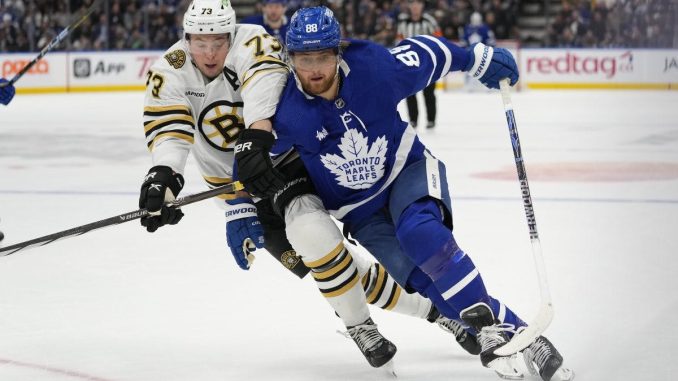
Toronto Maple Leafs in Misery; They ain’t our match
Between the ongoing ruin of Drake and the Maple Leafs, it might have been the worst day in Toronto since the Battle of York. But credit must be apportioned where it is due. To all those Leafs fans who, when down 3-1 to the Bruins, said the most Leafs thing possible would be to win the next two, providing unwelcome hope, and then lose Game 7 in overtime: Congrats. You know your Leafs. Your prize is more misery. Chuck it in the back of the closet with its forebears.
David Pastrnak scored 1:54 into overtime to win a clench-worthy 2-1 decider and send Boston through to the second round, where the formidable Panthers await. It was, in a tightly played and closely matched game, an aberrational instance of open ice, sprung by a fantastic—and maybe a bit lucky—bank pass from center ice from Hampus Lindholm. But that’s playoff hockey, baby: It only takes one moment to break a million hearts.

Pastrnak was publicly challenged by his coach to step up his game, and he did. Then Sheldon Keefe, after what was surely his last game, gave a pretty stunning quote that I’m sure won’t be referenced for many years to come. “When teams play the Leafs, they set up the game for the Leafs to beat themselves,” he said. In there—in those two declarations from opposite benches—lies the Leafs’ obituary. Just not good enough.
There is the temptation to look for the one thing or person to blame, but hockey doesn’t work like that. Ilya Samsonov, unexpectedly back between the pipes for Game 7, should have been quicker to react to Lindholm’s pass? Well, he allowed one goal in regulation, and that should be plenty stingy. He was good, but not good enough. Matthews missing two games with still-mysterious ailments, and not being 100 percent in this one? Well, they won those two games without him, and he set up the Leafs’ only goal on Saturday. Good, but not good enough. The defense and backchecking, stouter than usual this year and not actually a liability for once, failing to protect a third-period lead for longer than 81 seconds, and breaking down less than two minutes into OT? Say it with me.
This is the leitmotif of the era, as best as one can assign an identity to eight playoff failures each with their own distinct notes. The Leafs are not bad, or cursed: They are good enough to make the playoffs, and then face teams that either are better, or play better.
Seven first-round exits in eight seasons. An 0-6 record in winner-take-all games in that span. Eight total goals in those games. Never good enough,

When the goals don’t come, it’s hard not to look at the goalscorers, the forward group which takes up so much of Toronto’s cap space. William Nylander was the only member of the core four to score in these last three elimination games. John Tavares was anonymous, two points across seven games. Mitch Marner, three points in the series, felt Pastrnak’s wind as the Bruin skated right past him on the OT winner.
If the Maple Leafs are going to make major changes—and it’s not a given that they should or even can—it will happen to this quartet. It will be painful, as Toronto’s goalscoring is a strength many teams would kill for, and has gotten them to eight consecutive postseasons, a genuinely impressive achievement. But a top-heavy roster has not cleared the hump; the things that work in the regular season stop working in the grinder of the playoffs, against elite goalies and lockdown blue lines. The only way to meaningfully improve is to spread some of that core four money around the rest of the roster, and there’s no guarantee that it would be spent effectively. Matthews’s and Nylander’s raises kick in next season; Marner and Tavares have one year left on their deals, and no-movement clauses. Breaking up the band will not be easy even if the front office wants to do it.
Leave a Reply